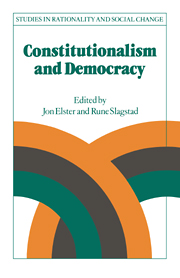Book contents
- Frontmatter
- Contents
- Notes on contributors
- Introduction
- 1 Gag rules or the politics of omission
- 3 Democracy as a contingent outcome of conflicts
- 3 Consequences of constitutional choice: reflections on Tocqueville
- 4 Liberal constitutionalism and its critics: Carl Schmitt and Max Weber
- 5 Democracy and the rule of law: some historical experiences of contradictions in the striving for good government
- 6 Neo-federalism?
- 7 Precommitment and the paradox of democracy
- 8 American constitutionalism and the paradox of private property
- 9 From liberal constitutionalism to corporate pluralism: the conflict over the enabling acts in Norway after the Second World War and the subsequent constitutional development
- 10 Arguments for constitutional choice: reflections on the transition to socialism
- 11 Constitutions and democracies: an epilogue
- Index
1 - Gag rules or the politics of omission
Published online by Cambridge University Press: 05 June 2012
- Frontmatter
- Contents
- Notes on contributors
- Introduction
- 1 Gag rules or the politics of omission
- 3 Democracy as a contingent outcome of conflicts
- 3 Consequences of constitutional choice: reflections on Tocqueville
- 4 Liberal constitutionalism and its critics: Carl Schmitt and Max Weber
- 5 Democracy and the rule of law: some historical experiences of contradictions in the striving for good government
- 6 Neo-federalism?
- 7 Precommitment and the paradox of democracy
- 8 American constitutionalism and the paradox of private property
- 9 From liberal constitutionalism to corporate pluralism: the conflict over the enabling acts in Norway after the Second World War and the subsequent constitutional development
- 10 Arguments for constitutional choice: reflections on the transition to socialism
- 11 Constitutions and democracies: an epilogue
- Index
Summary
A conversation is invariably shaped by what its participants decide not to say. To avoid destructive conflicts, we suppress controversial themes. In Cambridge, Massachusetts, old friends shun the subject of Israel in order to keep old friendships intact. Burying a divisive issue, of course, can be viewed censoriously – as evasiveness rather than diplomacy. But conflict-shyness is not merely craven: it can serve positive goals. By tying our tongues about a sensitive question, we can secure forms of cooperation and fellowship otherwise beyond reach.
Strategic self-censorship occurs in a variety of settings, from international summits to midnight trysts – including perhaps the limiting case of amnesia. In collective life, unmentionables abound. Within every group, speaking about tabooed subjects will provoke general consternation and embarrassment. After all, no one should wash his dirty linen in public. At faculty meetings, even garrulous professors will not prattle interminably about their alcohol problems or marital relations. Such universally appreciated uncommunicativeness can be easily explained. For one thing, no group's information-processing capacity is infinite. People cannot talk about everything at once; life is short; to avoid cognitive overload, different groups focus on different topics at different times.
Other reasons for sealing one's lips are less general and more pertinent to democratic theory. Sometimes an issue appears “unspeakable” because open airing would mortally offend prominent individuals or subgroups and permanently injure the cooperative spirit of the organization.
- Type
- Chapter
- Information
- Constitutionalism and Democracy , pp. 19 - 58Publisher: Cambridge University PressPrint publication year: 1988
- 50
- Cited by

